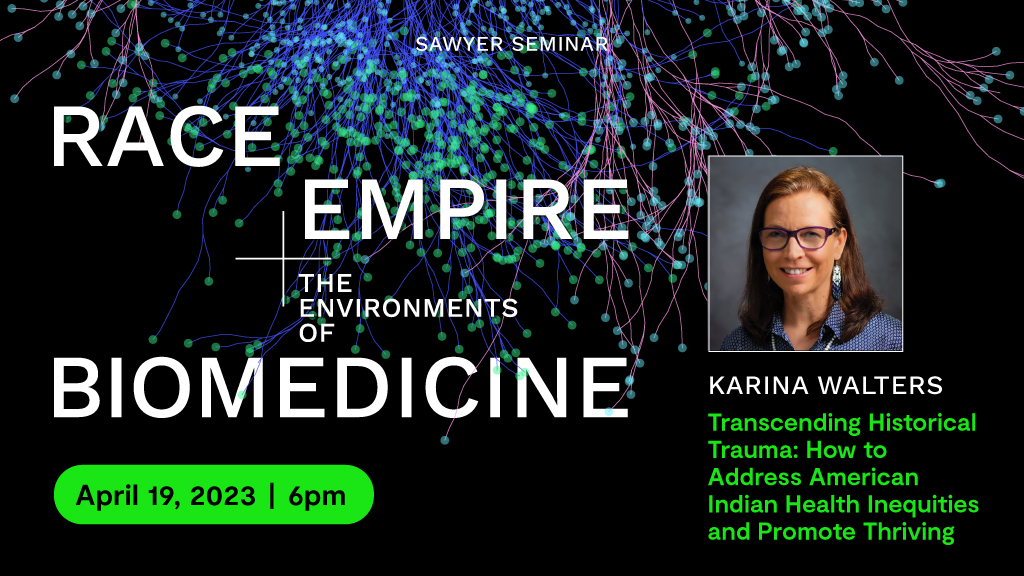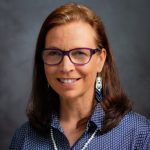Events

- This event has passed.

Karina Walters – Transcending Historical Trauma: How to Address American Indian Health Inequities and Promote Thriving
April 19, 2023 @ 6:00 pm - 7:30 pm | Cowell Ranch Hay Barn
Throughout history, settler colonialism has endeavored to erase the lived experiences and histories of American Indian and Alaska Native Peoples. Yet, Indigenous populations, particularly Indigenous women, remain strong and resilient pillars of communities. Oftentimes these [her]stories are missed in public health initiatives as a result of settler colonialism’s perpetual drive to erase and silence. In this talk, Dr. Walters will explore the latest advances in designing culturally derived, Indigenist health promotion interventions among American Indian and Alaska Native women. The talk will describe the indigenist methodological innovations utilized in the NIH funded Yappalli Choctaw Road to Health, a culturally focused, land-based obesity and substance abuse prevention program as well as the national multi-site Honor Project Two-Spirit Health Study. Consistent with tribal systems of knowledge, both studies illustrate the importance of developing culturally derived health promotion interventions rooted in Indigenist thoughtways and land-based practices to promote Indigenous thrivance and community well-being.
 Dr. Karina L. Walters (MSW, PhD) is the recently appointed Director of the Tribal Health Research Office at the National Institute of Health. She is an enrolled citizen of the Choctaw Nation of Oklahoma, a Katherine Hall Chambers University Professor at the University of Washington School of Social Work, and an adjunct Professor in the Department of Global Health, School of Public Health, and Co-Director of the Indigenous Wellness Research Institute (IWRI) at the University of Washington. Dr. Walters is world renowned for her expertise in developing behavioral and multi-level health interventions steeped in culture to activate health-promoting behaviors. She has written landmark papers on traumatic stress and health, historical and intergenerational trauma, and originated the Indigenist Stress-Coping model. She has led 22 NIH-funded studies, is one of the leading American Indian scientists in the country, and is only one of two American Indians (and the only Native woman) ever invited to deliver the prestigious Director’s lecture to the Wednesday Afternoon Lecture Series (WALS) at the NIH. She is the first American Indian Fellow inductee into the American Academy of Social Welfare and Social Work (AASWSW).
Dr. Karina L. Walters (MSW, PhD) is the recently appointed Director of the Tribal Health Research Office at the National Institute of Health. She is an enrolled citizen of the Choctaw Nation of Oklahoma, a Katherine Hall Chambers University Professor at the University of Washington School of Social Work, and an adjunct Professor in the Department of Global Health, School of Public Health, and Co-Director of the Indigenous Wellness Research Institute (IWRI) at the University of Washington. Dr. Walters is world renowned for her expertise in developing behavioral and multi-level health interventions steeped in culture to activate health-promoting behaviors. She has written landmark papers on traumatic stress and health, historical and intergenerational trauma, and originated the Indigenist Stress-Coping model. She has led 22 NIH-funded studies, is one of the leading American Indian scientists in the country, and is only one of two American Indians (and the only Native woman) ever invited to deliver the prestigious Director’s lecture to the Wednesday Afternoon Lecture Series (WALS) at the NIH. She is the first American Indian Fellow inductee into the American Academy of Social Welfare and Social Work (AASWSW).
Event logistics: Bicycling, car pooling, ridesharing, and public transportation are encouraged as parking is limited. If you drive to the event, please plan to park in UCSC Lot #115 or 116. To reach these lots, proceed through the main entrance to campus, continue up the hill from the information kiosk on Coolidge, then turn right at the Ranch View/Carriage House Road stoplight into the Carriage House/Campus Facilities parking lot. The Hay Barn is a 5-minute walk across the street from the parking lot. There will be directional signage to help you get to the correct parking lot and Barn entrances. Overflow parking will be available at lot 122. Download a parking map here.
If you have disability-related needs, please contact us at thi@ucsc.edu or call 831-459-1274 by April 12, 2023.
This event is part of the “Race, Empire, and the Environments of Biomedicine” Sawyer Seminar series.

